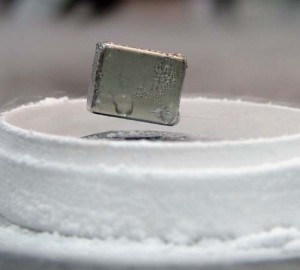Scientists at Washington State University are developing a battery so powerful that only a nuclear device is capable of storing more energy than it can. The material used to make the “battery” is xenon difluoride (XeF2), a white crystal primarily used to etch silicon conductors.
The crystal was placed in a diamond anvil cell, a tiny device that measures only two inches by three inches. The cell uses two tiny diamond anvils (as you might expect, considering its name) to produce incredibly high pressures in tiny, contained spaces.
Normally, the molecules in xenon difluoride stay relatively far apart. The squeezing process the crystals underwent in the diamond anvil cell forced the molecules closer and closer together. At first, the squeezing caused the crystal to become a two-dimensional semiconductor, but then something even more remarkable happened. When the pressure reached a million atmospheres, similar to the pressure found halfway to the center of the Earth, the molecules formed 3D metallic “network structures”, which forced all the mechanical energy of the compression process to be stored as chemical energy within the molecular bonds. At a million atmospheres, that’s a whole lot of stored energy.
Heading up this research is Washington State chemistry professor Choong-Shik Yoo, who says this “is the most condensed form of energy storage outside of nuclear energy.” The possible applications of the material pretty much all include the word “super”: superconductors, super-oxidizing materials that can destroy chemical and biological agents, not to mention new fuels and, most obviously, an energy storage device.
Source: Gizmodo.



Nice blog.I like the blog and information.I think the news about natural energy is interesting.I will share this to others.Thanks.
Nice blog.I like the blog and information.I think the news about natural energy is interesting.I will share this to others.Thanks.
After all, their main purpose is to act as a battery extender of the iPhone and nothing more.
hey this is really impressive. I read the article and i want to give you thanks for this nice post.
This is such a nice post.Very interesting information, is certainly helpful to me. Thanks for the instructions
i am interested in sports. boxing is my favorite sport. it is entertaining game. i read the article. thanks.
Solving
extra energy storage problems using Xenon diflouride capacitors:Hydro-pneumatically
compressed Xeondiflouride capacitors to
store energy out of extra electric
energy available from the windmills. Instead of a capacitor energy storage
using the dielectric to store electrical potential (by distorting the electron
orbits of the dielectric), it could use allotropic phase transformation of the
xenon difluoride to store its electromotive potential. The energy density would
still be surface area dependant but maybe an order of magnitude higher than a
standard capacitor. Normally, the molecules in xenon difluoride stay relatively
far apart. The squeezing process the crystals underwent in the diamond anvil
cell forced the molecules closer and closer together. At first, the squeezing
caused the crystal to become a two-dimensional semiconductor, but then
something even more remarkable happened. When the pressure reached a million
atmospheres, similar to the pressure found halfway to the center of the Earth,
the molecules formed 3D metallic “network structures”, which forced
all the mechanical energy of the compression process to be stored as chemical
energy within the molecular bonds. At a million atmospheres, that’s a whole lot
of stored energy. Most exciting for us is the potential as an energy storage
device. Imagine the benefits for electric vehicles –
such high energy and storage means much smaller batteries and much lower weight
for the same power, or much greater power and storage as you increase the
number of batteries.